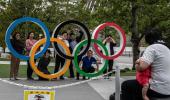'It will bring us together, as a people worldwide... I think it is going to be one of the most special Olympics, because of the circumstances.'

While the debate over the political, financial and health implications of holding the Tokyo Olympics in July rages around the world, triple jump gold medal hopeful Will Claye believes a crucial voice is not always being heard - that of the athlete.
The Games were postponed last year on safety grounds as the COVID-19 pandemic spread around the world and the threat to the health of athletes and the local community is still the major stumbling block to the Olympics going ahead.
Claye and his fellow athletes from the Red Bull stable -- climbers Janja Garnbret and Shauna Coxsey, triathlete Kristian Blummenfelt and rower Kjetil Borch -- are among 11,000 aspirant Olympians eager for their moment on the world stage.
While they have varying opinions on how the Games should proceed, Claye believes they are all united in their desire for certainty as they begin their final push to reach peak form in July and August.
"We have kind of gotten pushed to the side a little bit. But you can't push the most prolific sporting event in all of mankind to the side," American Claye, who won three medals in his two previous Games, told Reuters from his training camp in San Diego.
"We are seeing a lot of fake news coming out -- that the Olympics is happening, it is not happening, blah, blah... we just want the Games to happen and we just want it to be confirmed and there to be no doubt that is happening."
Recent polls have indicated dwindling public support in Japan, with up to 80% of those asked saying they want the Games to be postponed or cancelled, in large part because of concerns over an influx of foreign athletes.
However, Claye pointed to other sporting events getting underway around the world as proof that it can be done and Garnbret said bringing so many athletes together from around the world would be possible, if it is well organised.
Athletes will not be allowed to leave the Olympic village other than for training or competition.
"There is nothing to worry about because I know that everything will be planned and safe," said Slovenian Garnbret, who hopes to bag the first Olympic climbing gold medal in Tokyo.
British champion and fellow climber Coxsey was more cautious.
"I am hoping that everything will feel safe and feel right but that is something we have to be ready for and something we have to assess at the time," said Coxsey. "That is what everyone is geared up towards."
Organisers are set to release a new set of guidelines to athletes next week detailing safety measures.
Norwegian Blummenfelt competed at a World Triathlon Series event held without spectators in Hamburg in September and that gave him confidence his event at least could proceed in Japan.
The International Triathlon Union (ITU) ran the Hamburg event and will also be involved in Tokyo.
"It was really good, closed in, it was impossible to get in for anyone," said the half-Ironman world record holder.
"So, I think the ITU, if they decide to organise something, it will be safe and it will be properly done."
Whether to allow spectators at the venues is one of the two main questions facing Tokyo organisers as they enter the final six months of preparations for the Games.
On Thursday, Tokyo 2020 CEO Toshiro Muto said having empty venues is one of the options being considered although organisers hoped to have spectators.
"Even if people aren't there in the stadium, I know the world will be watching," said Claye.
"It will bring us together, as a people worldwide... I think it is going to be one of the most special Olympics, because of the circumstances."
The other major question is whether all athletes need to be vaccinated against COVID-19 before arriving in Japan.
International Olympic Committee President Thomas Bach has stressed the governing body is not in favour of athletes "jumping the queue" for vaccines ahead of people under more threat from the virus.
Israel and Australia have already said they will vaccinate their athletes before Tokyo but there has been strong push back from politicians, doctors and athletes themselves.
Norwegian Borch, the 2016 Olympic double skulls bronze medallist, said he is trying not to let such matters distract him from his preparations.
"This is way above our heads," he told Reuters while driving to his training camp, some 200 kilometres north of Oslo.
"First of all, it is the virus that is controlling the situation. Not the government, not the IOC."
Despite the frustrations of having their Olympic dreams put on hold for 12 months, the extra year has allowed the athletes time to relax and try new things.
In October, Garnbret found time to climb the 360-metre Trbovlje Power Station, Europe's highest chimney, with Red Bull stablemate Domen Skofic.
With less than six months to go until the opening ceremony, however, Borch said he is singularly focused on his preparations and doing his best to shut out all the political noise surrounding the Games.
"If you are out rowing and the wind starts picking up and the waves start picking up, you can't do shit about it right?" he said.
"You just cope with it and make the best out of it."












 © 2025
© 2025